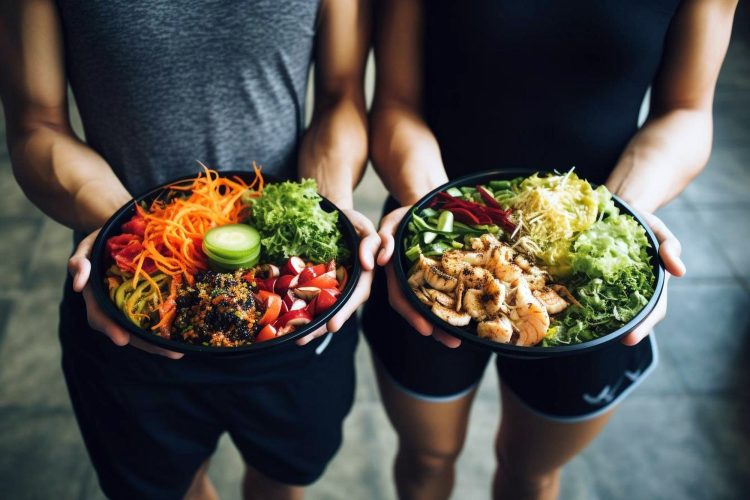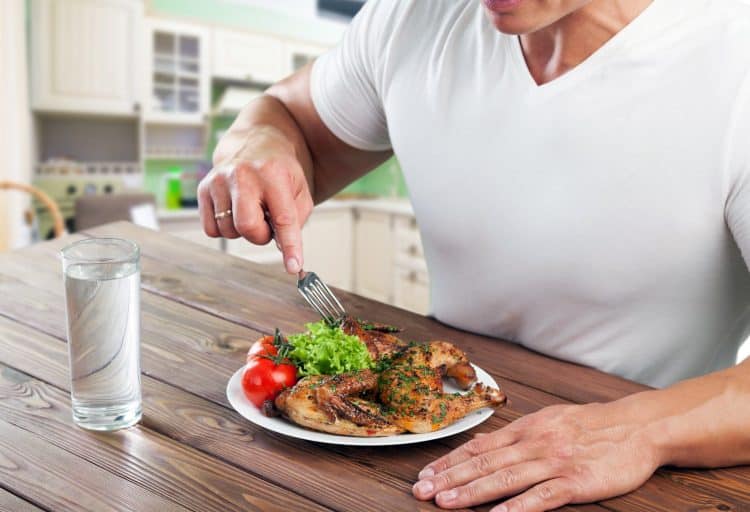As a veteran personal trainer, one of the most common questions I get is how meal timing impacts workout results. Most want to know if eating four to five meals can boost their metabolic rate and fast-track their weight loss progress. Others are curious if the ‘anabolic window’ after a training session can maximize hypertrophy.
The health and fitness industry is packed with myths. One of the most misunderstood subjects is meal timing and metabolism.
Before we get into the nitty-gritty of meal timing and metabolism, let’s first understand both these concepts.
Metabolism is the process through which the body changes food to energy. Think of metabolism as your body’s engine that powers all the essential functions that are necessary for keeping you alive. Metabolism turns your meals into fuel that builds muscles, powers your brain, and keeps your digestive system running.
The timing of your meals can significantly impact your metabolism’s efficiency. Timing your meals effectively can supercharge your workouts, boost muscle protein synthesis, and enhance sleep quality.
Here are some surprising meal timing and metabolism facts that you should know about:
#1: Your Body Clock Dictates Your Metabolism’s Efficiency
The human body is a machine, and metabolism is its engine. However, the engine is controlled by an internal clock known as the circadian rhythm. It is the 24-hour internal clock in our brain that regulates several functions, including the sleep-wake cycle, hormone release, and even how efficiently our bodies burn calories. (1)
Here’s why you must understand your circadian rhythm:
Metabolic Processes Aren’t Uniform
Your metabolism doesn’t remain the same throughout the day. Eating in sync with the circadian rhythm can boost digestion, fat loss, and insulin sensitivity.
Irregular Sleep Patterns Disruprt Metabolism
Going to bed at different times every day can throw your metabolism off balance. You must avoid late-night eating or exposure to bright light at night to boost your weight loss progress.
Understand Hunger Signals
Many people confuse feeling thirsty or bored with hunger. Learn to listen to your gut to distinguish between actual hunger pangs and a craving for snacks. When most people are genuinely hungry, they experience a growling stomach and lightheadedness. That said, you should not wait for these two signals to eat your next meal.
Timing your meals ensures that you hit your daily micro and macronutrient goals and progress toward your fitness goals.
How To Stay in Sync With Your Circadian Rhythm:
- Eat at roughly the same times daily. A regular eating schedule helps your body anticipate meals and optimize digestion.
- Consume a big breakfast and taper your meal as the day progresses.
- Lower the lights as the evening approaches to signal to your brain that it is time to prepare for sleep.
Dr. Andrew Huberman (a professor of neurobiology and ophthalmology at Stanford University) is a proponent of intermittent fasting (IF), which involves alternating between windows of voluntary fasting and eating. Huberman recommends eating most of your calories in the first half of the day.
“Eating during the daytime, when we are most active, benefits lean body mass, fat loss, and confers a more regular and stable circadian rhythm. On the flip side, eating during the night, when we are least active, can be detrimental to our health.” — Andrew Huberman
#2: It’s Not Only What You Eat, But Also When You Eat That Matters
If you’ve been around the fitness scene for some time, you’ve probably heard that breakfast is the most important meal of the day. It turns out there is some truth to this statement, and the contents and size of the first meal of the day can actually boost your metabolism. (2)
That said, here is what you must know about breakfast
Breakfast is Not a Must For Everyone
While eating a nutrient-dense whole-food breakfast has several perks, it is not mandatory for every individual. Also, there is no particular time defined for when you should have your first meal of the day.
Breakfast Can Boost Energy and Focus & Lower Cravings
Eating healthy in the morning can boost mental clarity and power you for your entire day. It reduces the risk of energy crashes. A healthy breakfast promotes satiety and reduces the chances that you will feast on junk foods during the day.
Adjust Your Intermittent Fasting Protocol
IF is among the most popular diet regimes. Practitioners of this diet should ideally set their eating and fasting windows so that they eat the first meal of the day before 12 p.m.
Dr. Layne Norton (Ph.D. in Nutritional Sciences) dissected a 2022 randomized controlled trial in a YouTube video. This was the conclusion: (3)
“There were no significant differences in fat loss, weight loss, or energy expenditure between the group that consumed more calories in the morning versus the evening. The only difference was that the morning load group reported feeling more satiated throughout the day. Eating more in the morning may suppress appetite throughout the day, which could help sustain a calorie deficit in the long term and lead to weight loss.” — Dr. Layne Norton
#3: Eating Late Could Compromise Your Results
Many people like to eat a big meal after a hard day’s work. However, unbeknownst to them, it might be sabotaging their results.
Remember, our bodies don’t work on a 9-to-5 schedule. According to a study published in the Nutrients journal, the probability of being obese increases five times in people who eat late at night (during the two hours before sleep). Conversely, for people who have a high caloric intake during morning hours (two hours after wake time), the probability of being obese decreases by 50%. (4)
Eating late at night also interferes with your sleep cycle, and running on a sleep deficit can make weight management even more challenging. Also, making healthy food choices while exhausted is nearly impossible.
Below are a few tips to boost metabolic rate, muscle synthesis, and even sleep quality:
Plan Ahead
Prepping a week’s worth of meals in advance is the most effective way to ensure you stay on track with your goals. It also eliminates the chances that you’ll eat highly processed foods when hunger strikes at odd hours.
Change Portion Sizes
If you cannot have an early dinner, you must make the final meal of the day smaller and more nutrient-dense. Design your meals so that you consume the bulk of your calories earlier in the day.
Evaluate the Ingredients
The ingredients of the day’s final meal are as important as the timing and the portion size. Prioritize lean proteins, whole grains, and a lot of vegetables.
Dr. Rhonda Patrick (Ph.D in Biomedical Science) highlighted the benefits of meal timing and its impact on sleep and metabolism in a YouTube video:
“Eating late at night can disrupt circadian rhythms, which may hamper metabolism and sleep quality.” — Rhonda Patrick
#4: Time Your Protein Intake To Boost Workout Performance & Results
Protein is the building block of muscles. When you lift weights in the gym, you develop micro tears in the muscle fibers. You must hit your daily protein intake target to ensure these muscles grow back bigger and stronger.
Following are a few practical protein intake tips based on your training time:
- Morning workouts: A small pre-workout snack like a fruit usually does the trick if you train first thing in the morning. That said, your post-workout meal will be your breakfast. Make it big to make it count!
- Midday workouts: To ensure you have enough energy for your workout, have a decent pre-training meal at least a couple of hours before your workout. Have your post-workout meal within two hours of the training session.
- Evening workouts: Timing evening workouts and meals can be tricky. I recommend training at least four hours before bedtime. Eat your pre-training meal two hours prior, and have a light final meal two hours before bed.
Pre- and Post-Workout Protein-Rich Meal Options
Below are a few pre- and post-training meal options to supercharge your workouts and recovery:
Pre-Workout Meals:
A pre-training meal should contain a balance of protein and carbs to ensure optimal energy and recovery. Here are some ideas:
- Oatmeal with berries and a protein shake
- Greek yogurt with fruit
- Whole grain toast with nut butter and banana (this is my personal preference)
Pro Tip: You can also have a stimulated pre-workout supplement to rip through the training session.
Post-Workout Meals:
Several studies have shown that total daily nutrient intake is more important than timing your protein intake after a workout (5). However, that doesn’t mean you should overlook post-training replenishment.
- Protein shake and a piece of fruit as soon after a workout as possible (non-negotiable)
- Tuna salad on whole-grain bread (within two hours)
- Grilled chicken with brown rice and vegetables (within two hours)
One of my personal training clients refers to himself as a ‘midnight fridge raiser.’ Even if your fridge is stocked with healthy, nutritious foods, eating at the wrong times can hamper your metabolism and sleep.
Deep sleep is like a reset button for your body. It is when your body repairs itself and releases essential hormones to regulate hunger cues, blood sugar levels, and fat-burning mechanisms. Overlooking sleep will invariably hamper your metabolism.
Eating big and heavy meals too close to bedtime can push your digestive system to work overtime and make you feel uncomfortable. Plus, high-sugar foods and processed foods lead to blood sugar level spikes and crashes, which can result in early morning wake-ups and restless nights.
I recommend my clients eat the day’s final meal at least two hours before bed. If you are eating over three meals a day, you should schedule all your snacks before dinner.
That said, if you must have a late-night snack, ensure it is a small protein-rich snack like Greek yogurt or a hard-boiled egg. Alternatively, you could go with a small fruit like an apple or a banana. Whatever you do, stay below the 200-calorie target.
#6: The Best Meal Timing is…Yours
Meals (and their timing) will vary for each individual. There is no one magic hour to eat for the best metabolism. You must follow a personalized diet program that suits your lifestyle and fitness objectives.
I recommend beginners work with a registered nutritionist to design the best diet plan for themselves.
Here are a few tips for finding the best meal time for yourself:
- Listen To Your Body: Start by understanding your hunger and fullness cues. Determine when you have the most and least energy and how your body reacts to meals at different times of the day.
- Experiments: Shift your meals for a few weeks. You can also experiment with different foods or diet plans, such as intermittent fasting, keto, or IIFYM.
With all said and done, we must recognize that research findings on the benefits of meal timing seem contradictory. Hence, the science of meal timing and metabolism is complex, and the research is ongoing.
Furthermore, the results can vary for each individual depending on factors like age, gender, body composition, fitness levels, and genetics. You must consult your healthcare provider before starting a new diet program.
Note: The content on Fitness Volt is for informative purposes only. Do not take it as medical advice to diagnose, prevent, or treat health problems. If you’re suffering from a health issue, are pregnant, or are under 18 years old, you should consult your physician before starting any new supplement, nutrition, or fitness routine.
Conclusion
Scheduling your meals can have a major impact on your metabolism and sleep quality. However, the most effective eating times will vary for each individual based on their lifestyle and preferences.
Some advice that has stood the test of time includes eating a hearty breakfast and eating two hours before a workout and within two hours of a training session. Experiment with different eating patterns and listen to your body to determine what works best for you.
If you have any questions about meal timing, drop them in the comments below, and I’ll be happy to help!
References
Fitness Volt is committed to providing our readers with science-based information. We use only credible and peer-reviewed sources to support the information we share in our articles.
- Reddy, S., Reddy, V., & Sharma, S. (2023). Physiology, Circadian Rhythm. In StatPearls. StatPearls Publishing.
- López-Sobaler, A. M.ª, Cuadrado-Soto, E., Peral-Suárez, Á., Aparicio, A., & Ortega, R. M.ª (2018). Importancia del desayuno en la mejora nutricional y sanitaria de la población (Importance of breakfast in the nutritional and health improvement of the population). Nutricion hospitalaria, 35(Spec No6), 3–6.
- Ruddick-Collins, L. C., Morgan, P. J., Fyfe, C. L., Filipe, J. A. N., Horgan, G. W., Westerterp, K. R., Johnston, J. D., & Johnstone, A. M. (2022). Timing of daily calorie loading affects appetite and hunger responses without changes in energy metabolism in healthy subjects with obesity. Cell metabolism, 34(10), 1472–1485.e6.
- Lopez-Minguez J, Gómez-Abellán P, Garaulet M. Timing of Breakfast, Lunch, and Dinner. Effects on Obesity and Metabolic Risk. Nutrients. 2019;11(11):2624. Published 2019 Nov 1. doi:10.3390/nu11112624
- Schoenfeld, B. J., & Aragon, A. A. (2018). Is There a Postworkout Anabolic Window of Opportunity for Nutrient Consumption? Clearing up Controversies. The Journal of orthopedic and sports physical therapy, 48(12), 911–914.
منبع: https://fitnessvolt.com/meal-timing-and-metabolism/





